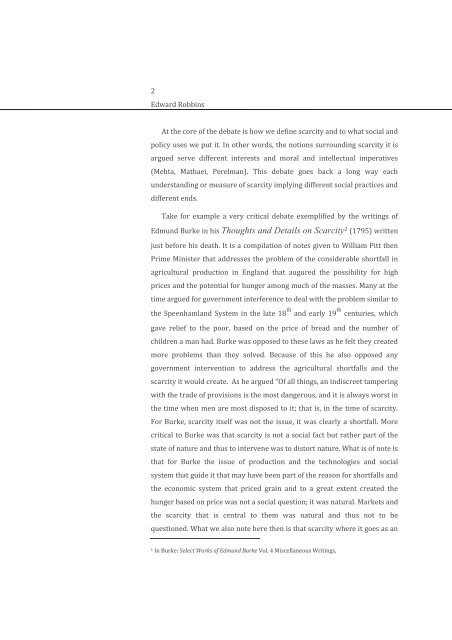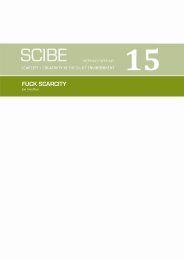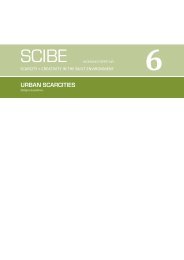SOME THOUGHTS ABOUT SCARCITY - SCIBE
SOME THOUGHTS ABOUT SCARCITY - SCIBE
SOME THOUGHTS ABOUT SCARCITY - SCIBE
Create successful ePaper yourself
Turn your PDF publications into a flip-book with our unique Google optimized e-Paper software.
2<br />
Edward Robbins<br />
At the core of the debate is how we define scarcity and to what social and<br />
policy uses we put it. In other words, the notions surrounding scarcity it is<br />
argued serve different interests and moral and intellectual imperatives<br />
(Mehta, Mathaei, Perelman). This debate goes back a long way each<br />
understanding or measure of scarcity implying different social practices and<br />
different ends.<br />
Take for example a very critical debate exemplified by the writings of<br />
Edmund Burke in his Thoughts and Details on Scarcity 1 (1795) written<br />
just before his death. It is a compilation of notes given to William Pitt then<br />
Prime Minister that addresses the problem of the considerable shortfall in<br />
agricultural production in England that augured the possibility for high<br />
prices and the potential for hunger among much of the masses. Many at the<br />
time argued for government interference to deal with the problem similar to<br />
the Speenhamland System in the late 18 th and early 19 th centuries, which<br />
gave relief to the poor, based on the price of bread and the number of<br />
children a man had. Burke was opposed to these laws as he felt they created<br />
more problems than they solved. Because of this he also opposed any<br />
government intervention to address the agricultural shortfalls and the<br />
scarcity it would create. As he argued “Of all things, an indiscreet tampering<br />
with the trade of provisions is the most dangerous, and it is always worst in<br />
the time when men are most disposed to it; that is, in the time of scarcity.<br />
For Burke, scarcity itself was not the issue, it was clearly a shortfall. More<br />
critical to Burke was that scarcity is not a social fact but rather part of the<br />
state of nature and thus to intervene was to distort nature. What is of note is<br />
that for Burke the issue of production and the technologies and social<br />
system that guide it that may have been part of the reason for shortfalls and<br />
the economic system that priced grain and to a great extent created the<br />
hunger based on price was not a social question; it was natural. Markets and<br />
the scarcity that is central to them was natural and thus not to be<br />
questioned. What we also note here then is that scarcity where it goes as an<br />
1<br />
In Burke: Select Works of Edmund Burke Vol, 4 Miscellaneous Writings,




